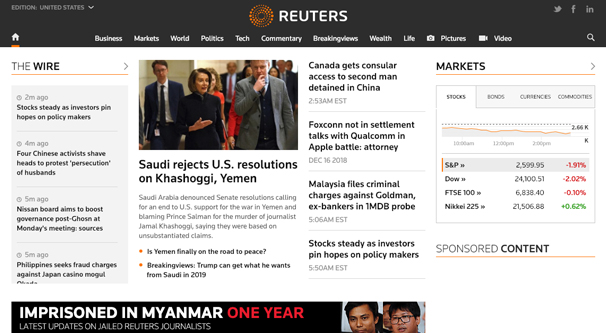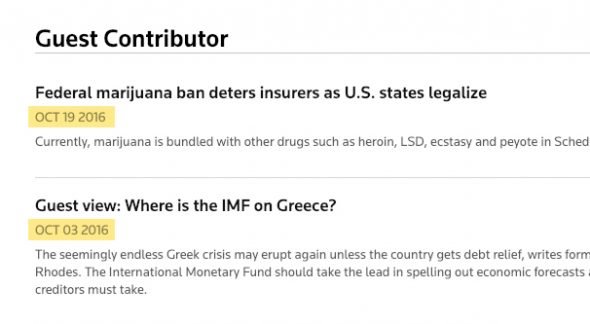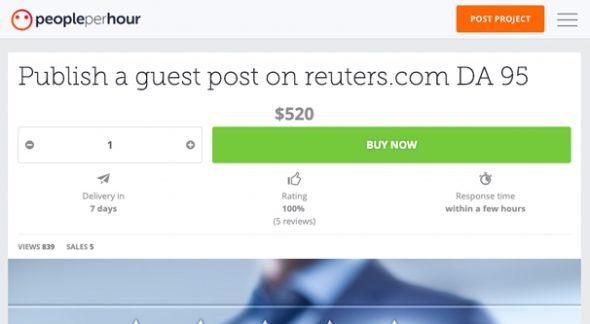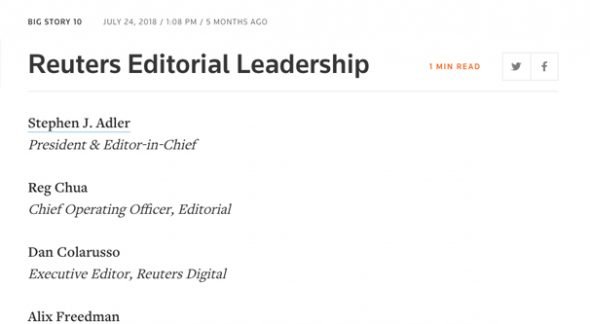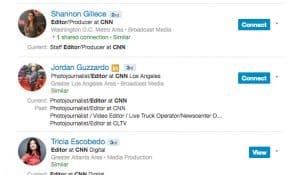Reuters is one of those massive sites with a ton of authority that would be a great boon to anyone who manages to post on the site. The question is, is it possible, or should you turn your efforts elsewhere?
All About Reuters
Reuters is an international news agency based in London. Their website has editions for a variety of geographic regions, including the United States, Brazil, Spain, India, Italy, Russia, Canada, France, and more. The agency has existed since 1851, making it one of the oldest still-running news publications in the world.
Reuters has a long and storied history, with its own share of controversy. One major element of their brand that is worth noting for anyone interested in writing for them is their policy of taking a “value-neutral approach” to writing. Where most blog writing is emotive, personal, and engaging, Reuters values accuracy, factual presentation, and objectivity. Successful writing for Reuters sticks to the facts and avoids emotive language. The example most commonly cited is their policy of not using the word “terrorist” in reporting, because whether or not someone is labeled a terrorist depends largely on which side of the issue you’re on. “One man’s terrorist is another man’s freedom fighter” is one specific quote.
Their focus on balance has caused a few controversies as well. In the pursuit of showing both sides of any given issue, they have ignored the imbalance in factual accuracy in some issues. Climate change is one major example: climate science is overwhelmingly supportive of the reality of climate change, but Reuters insists on showing both perspectives, publishing content from climate deniers with no facts to back them up.
All this goes to show that while Reuters is a highly respected journalistic edifice, it is not above mistakes, and there is an inherent bias in everything.
Reuters is a news agency, and as such, they tend to cover breaking news much more than editorial content, deep dive case studies, or any of the topics normally associated with guest posts. This makes it a fairly challenging site to approach, as you need to have something that is newsworthy while also not being covered by their staff of over 2,500 existing reporters.
Often times, this means taking a news article that was previously published and pitching a reversal on the topic. For example, this guest post published last year is a direct rebuttal to political happenings around the time of its publication. It’s frankly a really bad guest post that reads more like a small town letter to the editor, but hey, it got published, right? I’m not surprised that the author has no other contributions to the site.
What kind of topics does Reuters cover? Their main categories are Business, Markets, World, Politics, Tech, Commentary, Breakingviews, Wealth, and Life. Some of those are self-explanatory, while others might require a bit of explanation.
- Business is obviously enough just business news.
- Markets is news about financial markets, both domestically and globally.
- World is world news, happenings around the world as reported by many global news agencies.
- Politics is, as you might expect, coverage of political happenings around the world, with a focus on the region for the edition you’re reading.
- Tech is mostly news about tech, from the intersection of politics and tech to developments and new product releases.
- Commentary is a space for a little more emotional or opinionated writing, commentary on certain happenings along with speculation, dives into the history or context of an issue, or even just political nihilism. It seems to be primarily written by columnists from other parts of the site who just can’t contain themselves.
- Breakingviews is Reuters’ financial commentary section with deep dives into the fallout of various financial happenings.
- Wealth is a strange combination of “anything related to money” and investigations into the lives and habits of wealthy people.
- Life is a section about lifestyle with a lot of catch-all sub-sections like “arts” and “entertainment” that would be full sections on a more robust, broadly-focused website.
This is all basically just to say that Reuters covers basically anything they can, so long as they can tie it into business, financial, or political implications. There’s a lot of cross-over between their different sub-sections, with one article posted in multiple sections fairly frequently.
Looking Into Guest Posting
There are a few roadblocks to guest posting on Reuters. First of all, they don’t have any sort of “write for us” or “contribute” page listed anywhere that I can find. Their site search is terrible so it doesn’t bring up anything specific, just a lot of uses of the word “post” or “contribute” which, when writing objectively about political and financial and business issues, become very common words.
In the past, the site would flag guest posts with an introduction, much like the one I linked to about Trump up above, or this one about money markets. You’ll notice a few things about these posts.
First of all, they aren’t recent. The Trump post is from 2017, and it’s the absolute most recent guest post I can find on their site. The money one is from 2013. Second, neither of them have much in the way of attribution or links. They have brief intros or outros that talk about the author of the post, but they don’t have links at all. The 2013 post, that author has contributed a lot to Reuters, but it seems he was picked up as a regular reported up through early 2014 before he ceased writing.
So, there don’t seem to be any recent examples of guest posts, the old guest post authors I can find don’t seem to still contribute, and there were no links to be gained from posting on Reuters in the first place. If you’re interested in writing for Reuters, you have to content yourself with the byline and position as a thought leader as your sole compensation.
I’ve found about three possible options for you to pursue if you want to get content published on Reuters. Be aware, however, that they’re not guaranteed to work.
Option 1: Pay
The first option I can find is by far the easiest one, but it’s going to cost you. Specifically, you’re going to have to pay someone like this guy or this guy to post for you.
Those links take you to “hourlies” on People Per Hour, a site that’s similar to Fiverr or Freelancer or Upwork, where people can post something they can do and you can buy it for the price they set. In this case, those two sellers are selling posts with links to you on Reuters. How they manage it, or if they manage it, I don’t know. They cost a few hundred bucks each, so I haven’t tried to buy one to test it out.
The benefit of these options is that, if they work, they’re a quick and easy way to get your brand a link from Reuters. All you have to do is pay some money and wait. These PPH freelancers will look over your site, come up with content to create and promote, will perform all of the necessary outreach themselves, and will get you your publication with little or no hassle.
On the other hand, there are plenty of drawbacks. First and foremost is the fact that you’re basically paying for a sponsored link with no disclosure, which flies in the face of a lot of best practices. It’s entirely possible that, if Reuters decides to track down and crack down on these sellers, you’ll be out the money and out the link. You could also be blacklisted from their site or their network.
This is all assuming these sellers are legitimate. It’s always possible that they’ve set up these Hourlies themselves and have forged all of their reviews using false accounts. You never know the lengths of deception someone will go to just to make a few bucks, especially when even a single commission can give them enough money to last for a month in a low income area. I’m not saying these sellers are legitimate, nor am I saying they’re scams; I simply don’t know.
You also don’t know where on the site the posts will be published, what page on your site the post will link to, what the post will say, or how it will read. You’re trusting these people to write something with a link to you, which will naturally tie back to you.
They also don’t claim to write in your name, as a guest post actually would. You don’t get the name recognition, the byline, or the resume line from this kind of paid post. All you get is a link, and a fairly expensive one at that.
Option 2: Join
The second option is a lot more work than you’re probably willing to go through, and it’s far, far from guaranteed to work. Basically, just join their staff of writers! You can find the Thomson Reuters careers page over here.
In fact, as of this writing they have over 700 jobs posted on their careers page, but only seven of them have the keyword “writing” in their description. They’re looking for a copywriter in Minnesota, a news editor in London, and a correspondent in Thailand, along with a few marketing specialists in other locations.
If you can dig into their careers page and find something you’re capable of doing, you can give it a shot. Even the copywriter job, though, is aimed at copywriting for marketing and advertising material, not for their website. You never know what you’re signing up for until you read a specific posting or talk to a hiring manager.
Of course, “get a job” isn’t really a guest post, now is it? I’m including this as a suggestion because it’s possible some of you out there might actually be looking for a job like this, in which case, this could be a good opportunity for you. Also, if any of my readers get a job with Reuters, hook me up with a mention, eh?
Option 3: Pester
The third option is the most traditional sort of guest posting. Figure out what you want to write and what section of Reuters it would be best published in.
In this case, if you’re outside of the US or Europe, you might have a better shot. I imagine the press of people looking to be published is smaller in non-English zones, though I could always be wrong. I don’t actually have Reuters’ subscriber numbers or traffic counts anywhere to reference.
In any case, once you have figured out where your post should be published, write up your pitch the same way you usually would. Then start doing some digging. You want to find whatever editor is in charge of the section where you would be publishing, and figure out what their email address is. There are plenty of ways to do this, starting with the official Reuters publication of their editors.
Now, I wouldn’t directly pitch any of the people on that list. They’re your C-levels, the president and the chief editors and the global editors. They won’t even look at your email; it isn’t their job to deal with people like you. No, what you want to do is find the people who network with these people on LinkedIn or Twitter. Find the people who list themselves as a business editor or financial editor on Twitter. Find the people closer to the ground.
You can also consider looking for frequent contributors and asking them who their editor is, or if they know of a process that you could use to get a contribution publishing. Insiders are likely to know more about it than someone like me. But hey, if you figure it out, leave me a comment and tell me what their process is like.
 ContentPowered.com
ContentPowered.com
